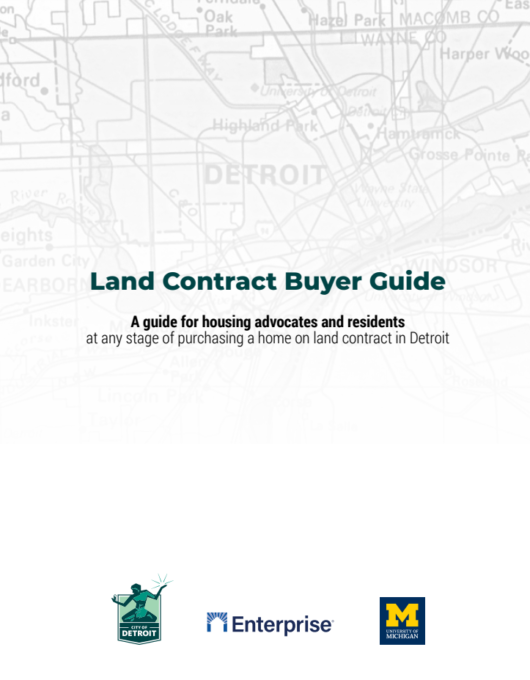New Land Contract Buyer Guide assists Detroiters on path toward homeownership

DETROIT – A new Detroit Land Contract Buyer Guide launched in conjunction with National Homeownership Month offers step-by-step guidance for housing counselors and prospective and current buyers on how to connect with resources, identify predatory or fraudulent situations, and successfully purchase their home. Land contracts are a valuable tool to achieve homeownership, but buyers often lack the support they need to navigate the purchasing process successfully.
The City of Detroit, Enterprise Community Partners, and University of Michigan’s Poverty Solutions co-authored and published the buyer guide. The guide includes information, do-it-yourself checklists, and guidance on risks for before signing, at signing, after signing, and after paying the land contract in full. The guide and additional resources, including materials in Spanish, are available at www.detroitlandcontracthelp.com.
These resources are the result of a grant from Center for Financial Empowerment to the City of Detroit, to support consumer financial protection issues in the city.
“The City of Detroit is committed to supporting homeownership, and we know that many Detroiters attempt to purchase their homes on land contracts without the benefit of support. The Detroit Land Buyer Contract Guide and supportive resources are part of our effort to fill the knowledge gap, connect buyers to resources that can help them avoid potential scams, and successfully navigate the home-buying process,” said Michele Oberholtzer, Chief Policy Advisor for Detroit Mayor Mike Duggan and co-author of the Land Contract Buyer Guide. “We appreciate the legal experts, housing advocates and Detroit residents whose input shaped the guide, and we’re proud to offer this valuable resource to residents and housing counselors.”
A land contract is a real estate transaction in which the buyer makes monthly payments to the seller for the purchase of a property over time. The seller holds the deed until the purchase is fully paid, and the buyer has most of the other rights and responsibilities of ownership throughout the payment period, including paying property taxes and making home repairs.
Land contracts are valuable tools for prospective homebuyers and homes that do not qualify for traditional mortgages. Historical red-lining, lack of credit, or need for home repairs have led many to turn to land contracts in the City of Detroit. However, land contracts have often been used as a predatory lending tool with high interest rates, lack of protection through the buying process, and other terms that increase the likelihood the buyer will default.
Mission-driven organizations in Detroit have used supportive land contracts to enable homeownership for credit-constrained households, leveraging the flexibility of land contracts and to provide leniency, as well as wraparound and assistance to buyers.
Karen Ann Kling, senior strategic projects manager at U-M’s Poverty Solutions, and Evelyn Zwiebach, Director with Enterprise Community Partners, Inc. in Detroit, documented this approach and recommended policies to reduce the abuse of land contracts in a policy brief published in May2021. Those findings inspired the creation of the Detroit Land Contract Buyer Guide, with support from the City of Detroit’s participation in the Cities for Financial Empowerment Fund’s Local Consumer Financial Protection Initiative.
“Prior research on land contracts focused on the potential for exploitation. But we learned from Detroit nonprofit and community development organizations that land contracts are not inherently predatory,” said Enterprise’s Zwiebach, who also co-authored the buyer guide. “The Land Contract Buyer Guide empowers buyers, equipping them with the information they need to make informed decisions about their home purchase and identify red flags that signal a bad deal. This is a critical first step in getting more Detroiters onto the pathway of homeownership, which contributes to greater housing stability, upward mobility and generational wealth.”
Related: In Good Faith: Reimagining the Use of Land Contracts
With support from the Brookings Institute and Ashoka, Zwiebach and Kling are continuing their research on reforms to land contract policies and program interventions that would protect buyers and maintain the flexibility of land contracts.
“We see the potential for land contracts to increase homeownership rates, improve property values, and advance racial equity by providing an alternative path to homeownership for people who historically and presently have faced discrimination in the housing market,” said Kling, who co-authored the buyer guide. “The Land Contract Buyer Guide takes the guesswork out of the purchase process. And in addition to putting critical information in residents’ hands, University of Michigan is currently working with Enterprise Community Partners to inform discussions regarding how we can change Michigan law to make land contracts a safer tool.”
The City of Detroit also supports the following homeownership initiatives:
- Make it Home, which gives residents living in foreclosed houses the option to purchase the property before the foreclosure auction;
- Michigan Homeowner Assistance Fund, which provides funds to help prevent mortgage delinquencies, foreclosure, or loss of utilities due to financial hardship during the pandemic.
- HOPE, Homeowners Property Tax Exemption program
- Detroit Tax Relief Fund to pay delinquent taxes for low-income homeowners approved for the HOPE exemption. (313) 244-0274
